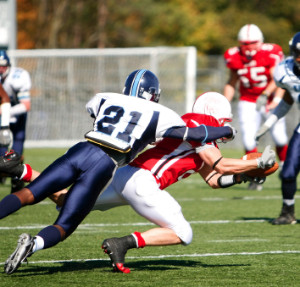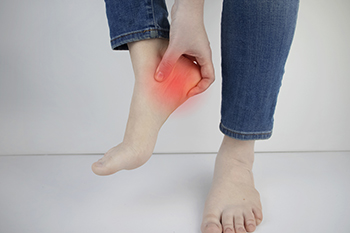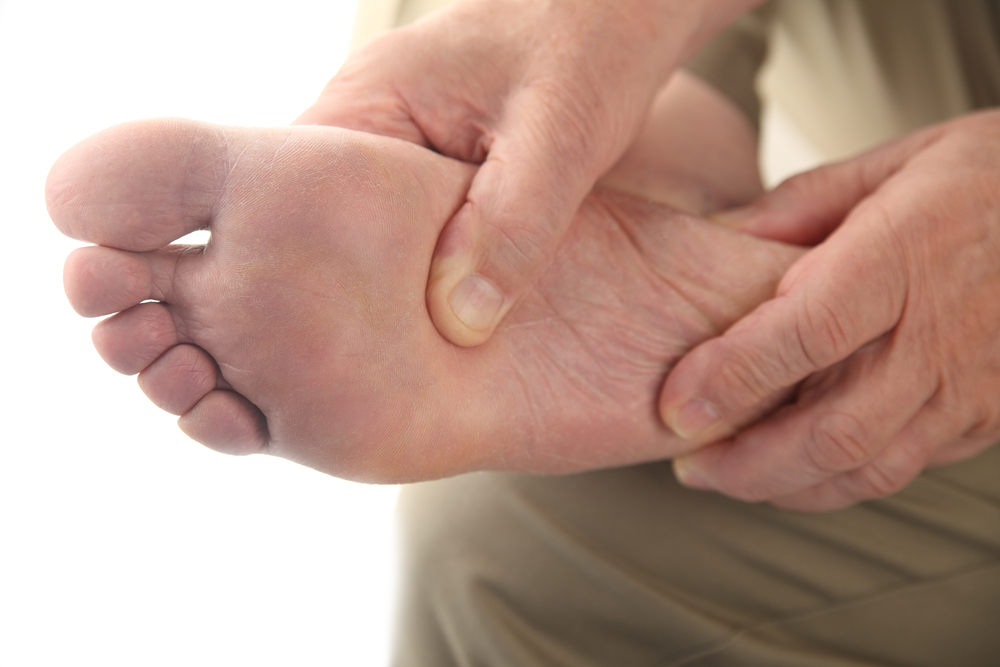Items filtered by date: November 2021
Risk Factors for Turf Toe
 Turf toe is a sports injury that often affects football players who play on artificial turf. Other athletes who compete on hard surfaces, such as ballet dancers, basketball players, and wrestlers, can also develop turf toe. Turf toe occurs when the big toe is bent (or hyper-extended) too much toward the top of the foot. Turf toe is generally accompanied by tenderness, swelling, immobility and stiffness in the big toe joint, but the most common sign is pain while bending the toe. The pain in the big toe can gradually increase over time if the toe is hyper-extended repeatedly. Athletes, or any patient, struggling to walk due to pain in their big toe should consult with a podiatrist for an accurate diagnosis of the condition and a correct course of treatment.
Turf toe is a sports injury that often affects football players who play on artificial turf. Other athletes who compete on hard surfaces, such as ballet dancers, basketball players, and wrestlers, can also develop turf toe. Turf toe occurs when the big toe is bent (or hyper-extended) too much toward the top of the foot. Turf toe is generally accompanied by tenderness, swelling, immobility and stiffness in the big toe joint, but the most common sign is pain while bending the toe. The pain in the big toe can gradually increase over time if the toe is hyper-extended repeatedly. Athletes, or any patient, struggling to walk due to pain in their big toe should consult with a podiatrist for an accurate diagnosis of the condition and a correct course of treatment.
Ankle and foot injuries are common among athletes and in many sports. They can be caused by several problems and may be potentially serious. If you are feeling pain or think you were injured in a sporting event or when exercising, consult with Gary Cockrell, DPM from Tennessee. Our doctor will assess your condition and provide you with quality foot and ankle treatment.
Common Injuries
The most common injuries that occur in sporting activities include:
- Achilles Tendonitis
- Achilles Tendon Rupture
- Ankle Sprains
- Broken Foot
- Plantar Fasciitis
- Stress Fractures
- Turf Toe
Symptoms
Symptoms vary depending upon the injury and in some cases, there may be no symptoms at all. However, in most cases, some form of symptom is experienced. Pain, aching, burning, bruising, tenderness, tightness or stiffness, sensation loss, difficulty moving, and swelling are the most common symptoms.
Treatment
Just as symptoms vary depending upon the injury, so do treatment options. A common treatment method is known as the RICE method. This method involves rest, applying ice, compression and elevating the afflicted foot or ankle. If the injury appears to be more serious, surgery might be required, such as arthroscopic or reconstructive surgery. Lastly, rehabilitation or therapy might be needed to gain full functionality in the afflicted area. Any discomfort experienced by an athlete must be evaluated by a licensed, reputable medical professional.
If you have any questions, please feel free to contact our offices located in Brentwood and Madison, TN . We offer the newest diagnostic and treatment technologies for all your foot care needs.
Reminder: When Was the Last Time...?
Who Is at Risk for Developing Plantar Fasciitis?
 Plantar fasciitis can occur when the ligament that runs along the bottom of the foot, known as the plantar fascia, becomes inflamed or torn. The most common sign of plantar fasciitis is pain and swelling in the heel that is worse in the morning or after standing for long periods of time. As patients get older, the plantar fascia loses its ability to stretch, and the fat pad of the heel begins to wear. This results in a higher risk of developing plantar fasciitis. Other factors for developing plantar fasciitis include being overweight and having high arches or tight calf muscles. Patients who believe that they have plantar fasciitis should consult with a podiatrist for a proper diagnosis and treatment plan.
Plantar fasciitis can occur when the ligament that runs along the bottom of the foot, known as the plantar fascia, becomes inflamed or torn. The most common sign of plantar fasciitis is pain and swelling in the heel that is worse in the morning or after standing for long periods of time. As patients get older, the plantar fascia loses its ability to stretch, and the fat pad of the heel begins to wear. This results in a higher risk of developing plantar fasciitis. Other factors for developing plantar fasciitis include being overweight and having high arches or tight calf muscles. Patients who believe that they have plantar fasciitis should consult with a podiatrist for a proper diagnosis and treatment plan.
Plantar fasciitis is a common foot condition that is often caused by a strain injury. If you are experiencing heel pain or symptoms of plantar fasciitis, contact Gary Cockrell, DPM from Tennessee. Our doctor can provide the care you need to keep you pain-free and on your feet.
What Is Plantar Fasciitis?
Plantar fasciitis is one of the most common causes of heel pain. The plantar fascia is a ligament that connects your heel to the front of your foot. When this ligament becomes inflamed, plantar fasciitis is the result. If you have plantar fasciitis you will have a stabbing pain that usually occurs with your first steps in the morning. As the day progresses and you walk around more, this pain will start to disappear, but it will return after long periods of standing or sitting.
What Causes Plantar Fasciitis?
- Excessive running
- Having high arches in your feet
- Other foot issues such as flat feet
- Pregnancy (due to the sudden weight gain)
- Being on your feet very often
There are some risk factors that may make you more likely to develop plantar fasciitis compared to others. The condition most commonly affects adults between the ages of 40 and 60. It also tends to affect people who are obese because the extra pounds result in extra stress being placed on the plantar fascia.
Prevention
- Take good care of your feet – Wear shoes that have good arch support and heel cushioning.
- Maintain a healthy weight
- If you are a runner, alternate running with other sports that won’t cause heel pain
There are a variety of treatment options available for plantar fasciitis along with the pain that accompanies it. Additionally, physical therapy is a very important component in the treatment process. It is important that you meet with your podiatrist to determine which treatment option is best for you.
If you have any questions, please feel free to contact our offices located in Brentwood and Madison, TN . We offer the newest diagnostic and treatment technologies for all your foot care needs.
Ways for New Runners to Prevent Injuries
 Many people who are looking to lose weight and stay in shape start running on a regular basis. Running can put a lot of stress on the body, especially the feet and ankles, so there are a few things that can be done to help prevent injuries. Beginning runners should make sure they have running shoes that fit properly. It's a good idea to ease into running by slowly increasing the pace and distance that you run. Warming up before a run is also helpful because it can prevent unnecessary stress on the feet and increase overall blood flow. As you begin to run more and more, it's wise to check the wear and tear your shoes. As the shock absorbers weaken, injury can become more likely. Lastly, if you are worried about a past foot or ankle injury or want to prevent one, we suggest you consult a podiatrist.
Many people who are looking to lose weight and stay in shape start running on a regular basis. Running can put a lot of stress on the body, especially the feet and ankles, so there are a few things that can be done to help prevent injuries. Beginning runners should make sure they have running shoes that fit properly. It's a good idea to ease into running by slowly increasing the pace and distance that you run. Warming up before a run is also helpful because it can prevent unnecessary stress on the feet and increase overall blood flow. As you begin to run more and more, it's wise to check the wear and tear your shoes. As the shock absorbers weaken, injury can become more likely. Lastly, if you are worried about a past foot or ankle injury or want to prevent one, we suggest you consult a podiatrist.
All runners should take extra precaution when trying to avoid injury. If you have any concerns about your feet, contact Gary Cockrell, DPM of Tennessee. Our doctor will treat your foot and ankle needs.
How to Prevent Running Injuries
There are a lot of mistakes a runner can make prior to a workout that can induce injury. A lot of athletes tend to overstretch before running, instead of saving those workouts for a post-run routine. Deep lunges and hand-to-toe hamstring pulls should be performed after a workout instead of during a warmup. Another common mistake is jumping into an intense routine before your body is physically prepared for it. You should try to ease your way into long-distance running instead of forcing yourself to rush into it.
More Tips for Preventing Injury
- Incorporate Strength Training into Workouts - This will help improve the body’s overall athleticism
- Improve and Maintain Your Flexibility – Stretching everyday will help improve overall performance
- “Warm Up” Before Running and “Cool Down” Afterward – A warm up of 5-10 minutes helps get rid of lactic acid in the muscles and prevents delayed muscle soreness
- Cross-Training is Crucial
- Wear Proper Running Shoes
- Have a Formal Gait Analysis – Poor biomechanics can easily cause injury
If you have any questions, please feel free to contact our offices located in Brentwood and Madison, TN . We offer the newest diagnostic and treatment technologies for all your foot care needs.
The Do’s of Diabetic Foot Care
People with diabetes are at an increased risk for developing foot ulcers and a variety of other foot problems. This is because diabetes can cause poor circulation, nerve damage, and immune insufficiency. Without an adequate blood supply, innervation, and a strong immune response, even small injuries on the feet can go undetected in their initial stages, heal poorly, and become infected. Taking very good care of your feet is essential if you are diabetic. At home, check your feet daily for any cuts, scrapes, sores, bruises, or other abnormalities and treat them as soon as possible. Take any excess pressure off your feet, especially if you have a foot wound, by resting or wearing an orthotic or off-loading device. You should also be under the care of a podiatrist who can monitor your foot health and treat any problems as soon as they occur.
Diabetic foot care is important in preventing foot ailments such as ulcers. If you are suffering from diabetes or have any other concerns about your feet, contact Gary Cockrell, DPM from Tennessee. Our doctor can provide the care you need to keep you pain-free and on your feet.
Diabetic Foot Care
Diabetes affects millions of people every year. The condition can damage blood vessels in many parts of the body, especially the feet. Because of this, taking care of your feet is essential if you have diabetes, and having a podiatrist help monitor your foot health is highly recommended.
The Importance of Caring for Your Feet
- Routinely inspect your feet for bruises or sores.
- Wear socks that fit your feet comfortably.
- Wear comfortable shoes that provide adequate support.
Patients with diabetes should have their doctor monitor their blood levels, as blood sugar levels play such a huge role in diabetic care. Monitoring these levels on a regular basis is highly advised.
It is always best to inform your healthcare professional of any concerns you may have regarding your feet, especially for diabetic patients. Early treatment and routine foot examinations are keys to maintaining proper health, especially because severe complications can arise if proper treatment is not applied.
If you have any questions please feel free to contact our offices located in Brentwood and Madison, TN . We offer the newest diagnostic and treatment technologies for all your foot and ankle needs.


